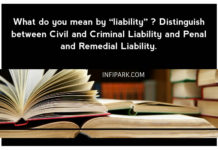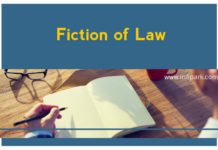The maxim ‘damnum sine injuria ‘ literally means that there is an act which caused damage but no legal right is infringed . Such an act is not actionable in the law of Torts.
The word ‘ damnum ‘ means damage . This damage may be loss of health , loss of service , physical hurt and loss of money or the like . The word ‘ injuria’ means a legal injury or tortuous act or an infringement of legal right . And the word ‘sine ‘means without . So the maxim means that a damage without infringement of any legal right . Where there is no infringement of legal right , whatever loss one may sustain , no action lies against that act which is not at all a wrongful . Therefore , ‘ damnum sine injuria ‘ does not afford any right to sue for legal remedy including claim of compensation and etc.
In order to make a person liable in law , the plaintiff must prove that he sustained legal injury . Damage without injury is not actionable . There are many acts which are , though harmful , are not wrongful , in the eye of law , and therefore , do not give rise to a right of action in favour of the person who sustains the damage .
An example may be given with respect to this maxim .
In the famous case of Gloucester Grammar School , the defendant , a schoolmaster , set up a rival school next to that of the plaintiff , with the result that the boys from the plaintiff’s school flocked to the defendant’s . The plaintiff sued the defendant for the loss . It was held that no suit could lie , because bonafide competition can afford no ground of action , whatever damage it may cause .
The general principle upon which the maxim is based is that if one exercises his common or ordinary rights , within reasonable limits , and without infringing other’s legal right , such exercise of rights does not give rise to an action in tort in favour of that other person .
In another famous case of Day Vs. Browning , where the plaintiff’s house was called “ Ashford Lodge “ for sixty years , and the adjoining house belonging to the defendant was called “ Ashford Villa “ for forty years . The defendant then altered the name of his house and started to call it “ Ashford Lodge “ . The plaintiff alleged that this act of defendant had caused him great inconvenience and annoyance , and had materially diminished the value of property . It was held that the defendant was not liable , as he had not violated any legal right of the plaintiff .
The Privy Council pointed out in the case of Roger Vs. Rajendra Dutta, that it is essential to an action in tort that the act complained of , should under the circumstances , be legally wrongful as regards the party complaining . That is , it must prejudicially affect him in some legal right .

















